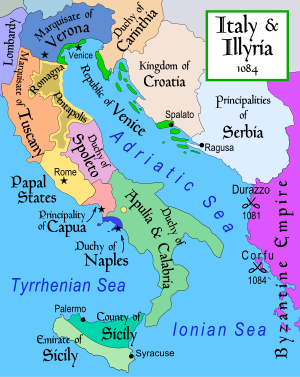Byzantine-Norman Wars
| Byzantine–Norman Wars | |||||||
|---|---|---|---|---|---|---|---|
 |
|||||||
|
|||||||
| Belligerents | |||||||
|
Byzantine Empire, |
Apulia and Calabria: Normans and Lombards Serbs (Duklja and Raška) |
||||||
| Commanders and leaders | |||||||
|
Alexios I Comnenus, John II Comnenus Manuel I Comnenus Andronicus Comnenus Isaac II Angelus |
Robert Guiscard, Bohemond, George of Antioch, William II Constantine Bodin, Margaritus of Brindisi |
||||||
A number of wars between the Normans and the Eastern Roman Empire were fought from c. 1040 until 1185 when the last Norman invasion of East Roman territory was defeated. At the end of the conflict, neither the Normans nor the Byzantines could boast much power; by the mid-13th century exhaustive fighting with other powers had undermined the rule of both, leading to the Byzantines losing Asia Minor to the Turks in the 14th century, and the Normans losing Sicily to the Hohenstaufen, who in turn were succeeded by the Angevins and finally the Aragonese.
The Normans had come from the Duchy of Normandy in West Francia, which in 911 had been granted to the Viking Rollo in the Treaty of Saint-Clair-sur-Epte by the French king Charles the Simple. The Normans and their new land took the name of these "Northmen". During the time that the Normans had conquered southern Italy, the Byzantine Empire was in a state of internal decay; the administration of the Empire had been wrecked, the efficient government institutions that provided Basil II with a quarter of a million troops and adequate resources by taxation had collapsed within a period of three decades. Attempts by Isaac I Komnenos and Romanos IV Diogenes to reverse the situation proved unfruitful. The premature death of the former and the overthrow of the latter led to further collapse as the Normans consolidated their conquest of Sicily and Italy.
Reggio Calabria, the capital of the tagma of Calabria, was captured by Robert Guiscard in 1060. At the time, the Byzantines held a few coastal towns in Apulia, including the capital of the catepanate of Italy, Bari. Otranto was besieged and fell in the October 1068; in the same year, the Normans besieged Bari itself and, after defeating the Byzantines in a series of battles in Apulia, and after any attempt of relief had failed, the city surrendered in April 1071, ending the Byzantine presence in southern Italy.
...
Wikipedia
